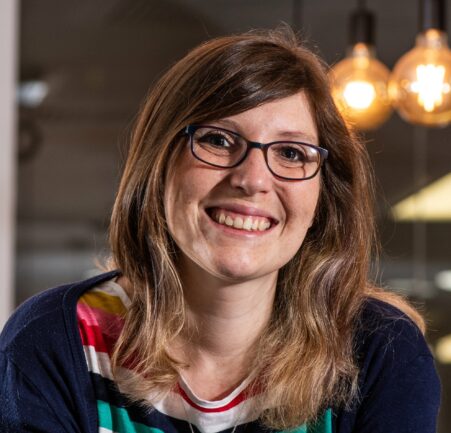
Dr Rachel Moseley is a Principal Academic in Psychology at Bournemouth University. Her research focuses on autism and the difficulties that autistic people often face in adulthood, principally around suicidality, self-injury and mental health. Rachel also studies issues around late-diagnosis, the burden of camouflaging and stigma, ageing, and lifespan transition points like menopause. Rachel is passionate about increasing acceptance of neurodivergent minds through public engagement, and improving life for autistic people through research, consultancy work and engagement with policymakers.
I am part of a team that was convened by the Autism Centre of Excellence at Cambridge to work on suicide prevention in autistic people. Discussions began 4 years ago, and the team has developed over time to its current form, which includes autistic people, experts by experience and professionals with experience in the clinical, research and/or voluntary sectors. I am autistic myself and have experience researching mental health in autistic adults. I also have lived experience with mental ill-health and suicidality.
Our team has just launched a new and important survey as the first step in the Autism Centre of Excellence’s developing suicide prevention programme. We want to hear from autistic people, with or without a diagnosis, who have struggled with suicidal thoughts. We also want to hear from those who support or have supported an autistic person who has experienced suicidal thoughts. You can read more about our reasons for focusing on suicide prevention, find out about the survey, and take part via www.autismcentreofexcellence.org/survey. However, in this article, I want to tell you about how the survey was developed.
We have worked hard during the creation of this survey and sincerely hope it does justice to autistic people affected by suicide, and those who care about them. Nevertheless, it is always hard to design a survey that works for everyone. At times, we had to make difficult decisions, which we tried to navigate in a spirit of integrity and transparency. For those same reasons, we want to share something about the development of this survey, and the steps we have taken to make it as good as possible.
Background
The team developed an impressive range of ideas about what the charity could do to reduce the number of autistic people who die by suicide. There are charities, companies, services, apps, and websites that could be scaled up or adapted to better help autistic people. The first challenge was deciding where to start. The obvious answer, of course, was to ask autistic people, as well as those who support them.
With this in mind, we developed this survey to ask autistic people about:
- their experiences of suicidal thoughts, feelings, and attempts.
- the help they sought and/or accessed, whether it was available and timely, whether it was helpful, and what it was about those experiences that made them helpful or not.
- whether some people find what they need within the NHS, for example, and whether there are particular services or apps that lots of autistic people have found helpful
- any ideas that autistic people think are particularly important for further exploration.
After team discussions, I produced numerous drafts of the survey, which were then reviewed by the team. The survey was also reviewed by an advisory group of autistic people and their families. They helped us to make our questions clearer and more sensitive.
Are there risks to talking about suicide online?
As researchers we are often asked whether it is dangerous to talk about suicide. There is considerable evidence suggesting that the answer is no: that talking about suicide does not give people new ideas if they were not already suicidal; and it does not increase suicidal thoughts or feelings in people who are already suicidal. The main source of potential harm online is not communications like ours about vulnerability, help seeking, and suicide prevention, but rather from those who represent suicide as a solution and provide information about methods.
Nevertheless, it is critical that we share any content in a sensitive and responsible way. To do that we have followed respected guidelines for good practice, such as those by the Samaritans. We also worked at length with autistic people, their families and our communications advisors to ensure that our messaging is appropriate. Our work, including communications about the study, has been approved by an ethics committee at the University of Cambridge.
Including autistic people in survey development
For many people, suicide is an immensely painful topic. Some people experience suicidal thoughts every day. We needed to make sure our survey questions were sensitive and relevant for autistic people. We therefore strove to include as many autistic people as possible throughout the development of the survey, including those who have experienced suicidal thoughts and feelings. Overall, feedback about the work we are doing was very positive.
At times, as is the case when working with any large group, we received some contradictory suggestions. For example, some autistic people liked that we signposted participants to services and resources (like the Samaritans) at several points throughout the survey. Others pointed out that these services are not dedicated to autistic people and might not be helpful for them. For this reason, it was not always possible to follow every suggestion. In this case, we decided it was better to offer some ideas for support even if they are not tailored for autistic people, as they may still be of some help to many. We also responded to the panel by explaining, point by point, what we had done in relation to each suggestion and exactly why we could not implement some of the suggested changes.
Including autistic people in spreading the word, and driving participation in the survey
The success of the research will be learning as much as possible to deliver the right actions. We need as many people as possible to complete this survey, so a good plan for spreading the word is vital. We knew that social media would be a key channel to reach the community that we wanted to take part.
We also knew that our messages need to be appropriate. This is such an incredibly sensitive topic, so we knew that we needed to talk to lots more autistic people, parents and carers, and those who’ve been bereaved. We can’t avoid talking about suicide, given that it’s the topic of our work – it wouldn’t be transparent to use euphemisms or leave the word out entirely – but we need to talk about it as sensitively as possible. We also need to balance raising awareness of this problem with not painting too bleak a picture of what it means to be autistic. We do not want to alarm those who are new to an autism diagnosis or wondering if they might be autistic. It is clear that not all autistic people become suicidal. We have tried to end all our messages with the point that we are working to make a difference, which we believe is a very positive message of hope.
We had one-to-one discussions with community members, including with those who have been bereaved by the suicide of an autistic loved one, talking about the wording and visuals that would best communicate our messages. We adapted the content based on these discussions and then sought feedback from a larger group, receiving responses from over 90 members of our community advisory panel. This generated extremely useful feedback.
Next steps toward reducing suicide in autistic people
While evidence suggests that suicide is far more common in autistic people than non-autistic people, we believe that suicide is preventable, and are working hard to identify ways to make that a reality. We will strive to include autistic people to the very end of this project. The data will initially be analysed and interpreted by a small team of autistic and non-autistic academics, including people with lived experience of suicidality. We will carefully record the steps we take to analyse and interpret the data. We will write a report explaining what we did and what we found and will produce it in multiple formats for accessibility.
At that point, we will share the report with members of the Autism Centre of Excellence’s Community Advisory Panel. We will ask if they feel we have interpreted the data appropriately and accurately. We will also ask for their thoughts and interpretations of the findings, and their ideas about next steps. Once we have a final report, we will make it publicly available. The Autism Centre of Excellence will use the report to guide its future work on suicide prevention in autistic people.
In addition, one or more academic papers will be written based on this survey, and submitted for publication in peer-reviewed journals.
Will you complete the survey?
Again, we believe that suicide is preventable, and the team is working hard to identify ways to make that a reality. If you are autistic, with or without a diagnosis, and have struggled with suicidal thoughts, or if you support or have supported an autistic person in that situation, please consider completing the survey. It should take about 15 minutes and could provide vital information.
Thank you!
A huge thank you to the research team and everyone who has supported us in developing this survey, especially those with lived experience who have taken the time to work with us on such a difficult topic. Your support, feedback and ideas have all been incredibly valuable!
Are you struggling right now?
If you are experiencing suicidal thoughts or feelings, please reach out for help. We know this can be difficult, and past experiences can sometimes make us think others can’t help. However, many, many people do find support and move past these difficult times. If you need them, we have some ideas for where you might find help via www.autismcentreofexcellence.org/resources
